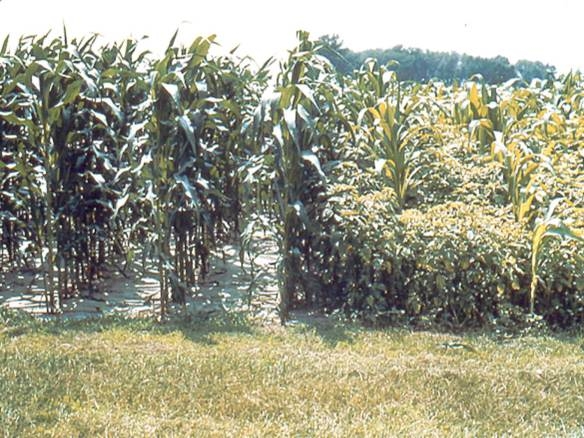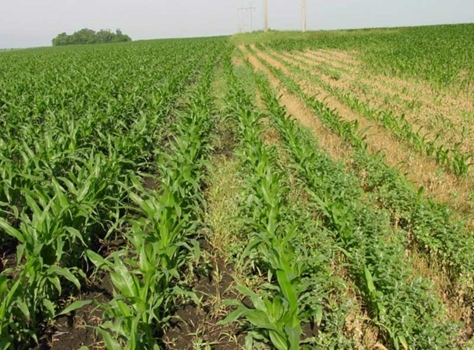Herbicide tolerant crops
|
|
Weeds are one of the biggest obstacles between farmers and a successful harvest, competing with crops for nutrients, water, and sunlight. The historical remedy has been cultivation, with a hoe or a plow. Herbcides were a boon to farmers, dramatically reducing the need for grueling field labor. Modern biotechnology has allowed farmers to use a newer generation of herbicides that are same for animals and insects and help conserve soil health.
Any farmer will tell you that the single biggest threat to a healthy harvest is weeds (The pre-glyphosate generation: I was a child laborer). They steal moisture, nutrients and sunlight from crops and left uncontrolled can reduce a harvest to nothing. For thousands of years weed management relied on hand weeding, which is tedious, back breaking, and endless. It is no surprise that mechanical cultivation was widely and rapidly adopted when plows were invented, pulled first by beasts of burden and then by tractors. But while mechanical cultivation was an enormous improvement it is hugely damaging to the microbial ecosystems essential to healthy, sustainable soils. It leads also to soil compaction and erosion, topsoil losses, and increased CO2 emissions. This is why farmers around the world welcomed the development of weed killing sprays as a godsend.
The first herbicides were invented by Mother Nature, as plants themselves evolved chemicals to suppress germination and growth of neighboring plants in order to protect their own access to water and nutrients and access to light (see The ecosystem and evolutionary contexts of allelopathy). In the 20th century synthetic chemists developed a number of new compounds with varying modes and ranges of action that kill different weeds. Most of these also damage some, if not all crop plants, however, and some require special handling to ensure safety for humans and other animals. The development of broadly effective, less toxic herbicides coupled with genetically engineered tolerance in specific crops vastly improved crop yields while dramatically reducing environmental impacts. This made effective and sustainable weed control much more widely available and ushered in a new agricultural revolution. The economic and environmental benefits have been monumental (see Environmental impacts of genetically modified (GM) crop use 1996-2015: Impacts on pesticide use and carbon emissions; Global income and production impacts of using GM crop technology 1996-2014). Biotech traits overall, with herbicide tolerance being a major factor, have seen global yields increase by 22%, while pesticide use is down by 37% on average, and farmer incomes are up 68% (see A Meta-Analysis of the Impacts of Genetically Modified Crops).
Despite such clear, massive, and widespread benefits some reject such advances; they are mostly well fed urbanites in rich industrial nations, generally not farmers or the hungry in developing countries. They have mounted a huge campaign to ban the safest of the modern herbicides, glyphosate (trade name Roundup) claiming a variety of health risks including cancer. But global regulatory authorities have repeatedly found glyphosate to be safer than the alternatives (see Peer review of the pesticide risk assessment of the active substance glyphosate; Glyphosate not classified as a carcinogen by ECHA; Re-evaluation Decision RVD2017-01, Glyphosate; U.N. experts find weed killer glyphosate unlikely to cause cancer. The propaganda campaign has been shown to be grounded in deceit (A Scientist Didn't Disclose Important Data-and Let Everyone Believe a Popular Weedkiller Causes Cancer: A World Health Organization group called RoundUp a "probable carcinogen," but it didn't have all the facts; Glyphosate and Iarc-gate) and farmers have risen in defense of the technology (Glyphosate ban will kill 'conservation agriculture', French farmers warn; German farmers battling to change minds on glyphosate before the chemical is banned; Weedy paddock used to highlight why glyphosate is needed; "Sans glyphosate, je devrais utiliser des desherbants 5 a 10 fois plus chers"; Farmers want EU glyphosate licence renewed; Why sugar beet farmers are all in on GMOs).
Biotech improved, herbicide tolerance in seeds linked with safe herbicides are particularly valuable to smallholders in the developing world, easing their lives and improving their livelihoods so much that one Kenyan scientist Florence Wambugu has said "A woman's place is in the laboratory, creating new herbicide tolerant crops, so my daughters don't have to spend their lives bent over and pulling weeds as my mother did."
It is important to recognize, however, that even these new technologies can be misused, and proper stewardship, such as rotation of crops and modes of action, are still essential. Where good practices have not been followed we have seen herbicide resistant weed problems re-emerge (Farmers Cope With Roundup-Resistant Weeds). And while these, too, can be met with technological solutions, things can still go wrong (No easy solution for dicamba drift problem) further reinforcing the absolute importance of good stewardship.
|
|
|







